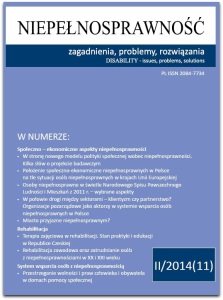Dzienne archiwum: 15 października 2014
Położenie społeczno-ekonomiczne niepełnosprawnych w Polsce na tle sytuacji osób niepełnosprawnych w krajach Unii Europejskiej
Źródło artykułu: „Niepełnosprawność – zagadnienia, problemy, rozwiązania”, kwartalnik, nr II/2014 (11)
Barbara Gąciarz
Akademia Górniczo-Hutnicza w Krakowie
Jerzy Bartkowski
Uniwersytet Warszawski
Streszczenie
Opis położenia społecznego osób niepełnosprawnych nie jest wyłącznie rejestracją
 statycznego stanu tej kategorii społecznej w różnych wymiarach, ale także określeniem jej pozycji w odniesieniu do reszty społeczeństwa. Jego znaczenie polega przede wszystkim na identyfikacji różnych aspektów społecznego uprzywilejowania lub upośledzenia danej kategorii osób. W przypadku osób niepełnosprawnych ma to bezpośrednie znaczenie dla polityki publicznej, gdyż jej podstawową funkcją powinno być wyrównywanie szans tych osób oraz zapewnianie im standardu życia porównywalnego z ogółem społeczeństwa. W tekście przedstawiamy charakterystykę położenia osób niepełnosprawnych w Polsce na tle sytuacji niepełnosprawnych w krajach „starej” i „nowej” UE, zarówno poprzez opis typowych cech społeczno-demograficznych, określających poziom zamożności i zdolność do zaspokajania potrzeb, jak i charakterystykę cech świadomości społecznej tej kategorii osób, które wyznaczają najważniejsze orientacje społeczne ich działań.
statycznego stanu tej kategorii społecznej w różnych wymiarach, ale także określeniem jej pozycji w odniesieniu do reszty społeczeństwa. Jego znaczenie polega przede wszystkim na identyfikacji różnych aspektów społecznego uprzywilejowania lub upośledzenia danej kategorii osób. W przypadku osób niepełnosprawnych ma to bezpośrednie znaczenie dla polityki publicznej, gdyż jej podstawową funkcją powinno być wyrównywanie szans tych osób oraz zapewnianie im standardu życia porównywalnego z ogółem społeczeństwa. W tekście przedstawiamy charakterystykę położenia osób niepełnosprawnych w Polsce na tle sytuacji niepełnosprawnych w krajach „starej” i „nowej” UE, zarówno poprzez opis typowych cech społeczno-demograficznych, określających poziom zamożności i zdolność do zaspokajania potrzeb, jak i charakterystykę cech świadomości społecznej tej kategorii osób, które wyznaczają najważniejsze orientacje społeczne ich działań.
Słowa kluczowe: osoby niepełnosprawne, położenie społeczne, jakość życia, Unia Europejska
Socio-economic position of the disabled in Poland against the situation of persons with disabilities in the European Union
Summary
The description of the social position of persons with disabilities is not only a registration of the static state of this social category in different dimensions, but the determination of its position in relation to the rest of society as well. Its importance lies primarily in identifying various aspects of social privilage or impairement of the given category of individuals. In the case of persons with disabilities it has a direct relevance to public policy, as its primary function should be equal opportunities for these people and providing them with a standard of living comparable to the general public. In the text we present the characteristics of the situation of persons with disabilities in Poland against the situation of persons with disabilities in the countries of the „old” and the „new” EU, both through the description of the typical socio-demographic characteristics defining the level of wealth and the ability to meet the needs, as well as characteristics of the features of social consciousness in this category of individuals that define the most important social orientations of their activities.
Keywords: persons with disabilities, social situation, quality of life, the European Union
